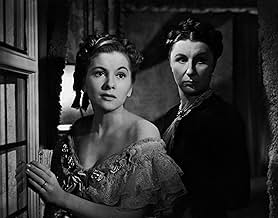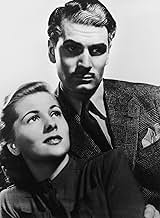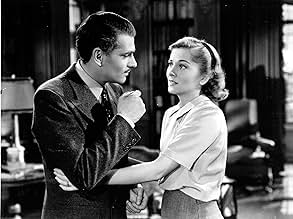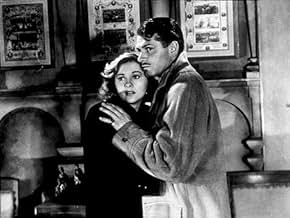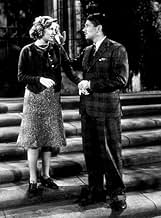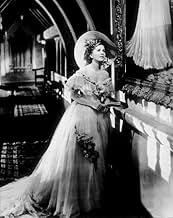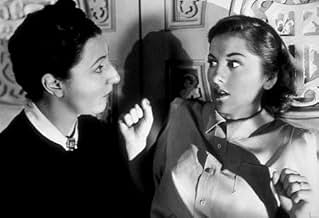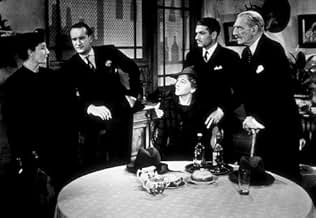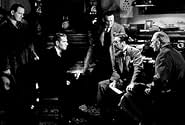A self-conscious woman juggles adjusting to her new role as an aristocrat's wife and avoiding being intimidated by his first wife's spectral presence.A self-conscious woman juggles adjusting to her new role as an aristocrat's wife and avoiding being intimidated by his first wife's spectral presence.A self-conscious woman juggles adjusting to her new role as an aristocrat's wife and avoiding being intimidated by his first wife's spectral presence.
- Won 2 Oscars
- 7 wins & 10 nominations total
Bunny Beatty
- Maid
- (uncredited)
Billy Bevan
- Policeman
- (uncredited)
Best Picture Winners by Year
Best Picture Winners by Year
See the complete list of Best Picture winners. For fun, use the "sort order" function to rank by IMDb rating and other criteria.
Storyline
Did you know
- TriviaPer Sir Alfred Hitchcock's instructions, Dame Judith Anderson rarely blinks her eyes while playing Mrs. Danvers.
- GoofsThe oath taken by the policeman at the inquest is incorrect. He quietly adds 'So help me God' at the end. These words are not used in the UK.
- Quotes
[the new Mrs. de Winter wants to dispose of Rebecca's letters]
The Second Mrs. de Winter: I want you to get rid of all these things.
Mrs. Danvers: But these are Mrs. de Winter's things.
The Second Mrs. de Winter: *I* am Mrs. de Winter now!
- Crazy creditsThe original 1940 credits read "Selznick International presents its picturization of Daphne Du Maurier's 'Rebecca'". The credits on the re-issue version read "The Selznick Studio presents its production of Daphne Du Maurier's 'Rebecca'".
- Alternate versionsThe opening credits were re-done (with different font) for the 1950's re-release of the movie. It is these credits that have turned up on all telecasts of the film (even as recently as 2013) and all previous video releases. The Criterion release (which is now only available through outlet stores) restores all of the credits to their original form.
- ConnectionsEdited into The Last Tycoon: Pilot (2016)
- SoundtracksLove's Old Sweet Song (Just a Song at Twilight)
(1884) (uncredited)
Music by J.L. Molloy
Hummed by Joan Fontaine
Featured review
Director Alfred Hitchcock is renowned for his visual acuity, creating some of the most memorable shots in movie history; he also had a keen eye for beauty, casting some of Hollywood's most stunning actresses in iconic roles: Grace Kelly in Rear Window, Maureen O'Hara in Jamaica Inn, Tippi Hedren in The Birds, Ingrid Bergman in Spellbound, and Janet Leigh in Psycho, to name but a few. Perhaps his most enchanting leading lady was Joan Fontaine, who won an Oscar for her role in Suspicion (1941), but who was never more appealing than in her first film for Hitch, Rebecca, based on a novel by Daphne Du Maurier.
The gorgeous Fontaine plays a meek young woman (we never discover her name, but she's not the 'Rebecca' of the title) who falls for rich aristocrat 'Maxim' de Winter (Laurence Olivier) while working in the South of France. Equally besotted, Maxim proposes to the self-effacing beauty, and takes her back to his ancestral home, Manderley, which he once shared with his first wife Rebecca, before she drowned in a boating accident. The new Mrs. de Winter does her best to adapt to her new lifestyle, but is constantly under the shadow of her predecessor, with stern housekeeper Mrs. Danvers (Judith Anderson) being particularly disapproving of Maxim's new bride, deliberately driving a wedge between the married couple and even going so far as to try and talk Mrs. de Winter Mk. II into killing herself.
Thus far, the film is pure melodrama and sappy romance, and avid Hitchcock fans might be wondering where the murder and mystery is; worry, not, for this comes in the second half of the film and provides plenty of intrigue and suspense as Maxim reveals what really happened to his first wife and is subsequently suspected of her murder. Both his wife and the viewer are aware of his innocence, but with Rebecca's lover Jack Favell (George Sanders) accusing Mr. de Winter of murder, and plenty of damning evidence, things are looking pretty bad for the poor fellow. It all wraps up nicely in the end, of course, but there are plenty of tense moments along the way, all handled in the director's typically assured manner, with bags of atmosphere and sumptuous cinematography.
But as great as the direction and story are, it is the performances that really make Rebecca a winner: Olivier is perfect as the troubled toff, Anderson is wonderfully wicked as scheming housekeeper Danvers, nobody does 'bumbling oaf' quite as well as Nigel Bruce (playing Major Giles Lacy, who puts his foot in his mouth whenever he speaks), Sanders is suitably slimy as adulterous blackmailer Favell, and Fontaine... well, she is completely captivating, every smile, every tilt of her head, and every nervous glance guaranteed to win over the viewer (she was nominated for Best Actress in a Leading Role at the Oscars, but lost to Ginger Rogers). Hell, even the dog that played Maxim's mutt Jasper was excellent (so cute!).
The gorgeous Fontaine plays a meek young woman (we never discover her name, but she's not the 'Rebecca' of the title) who falls for rich aristocrat 'Maxim' de Winter (Laurence Olivier) while working in the South of France. Equally besotted, Maxim proposes to the self-effacing beauty, and takes her back to his ancestral home, Manderley, which he once shared with his first wife Rebecca, before she drowned in a boating accident. The new Mrs. de Winter does her best to adapt to her new lifestyle, but is constantly under the shadow of her predecessor, with stern housekeeper Mrs. Danvers (Judith Anderson) being particularly disapproving of Maxim's new bride, deliberately driving a wedge between the married couple and even going so far as to try and talk Mrs. de Winter Mk. II into killing herself.
Thus far, the film is pure melodrama and sappy romance, and avid Hitchcock fans might be wondering where the murder and mystery is; worry, not, for this comes in the second half of the film and provides plenty of intrigue and suspense as Maxim reveals what really happened to his first wife and is subsequently suspected of her murder. Both his wife and the viewer are aware of his innocence, but with Rebecca's lover Jack Favell (George Sanders) accusing Mr. de Winter of murder, and plenty of damning evidence, things are looking pretty bad for the poor fellow. It all wraps up nicely in the end, of course, but there are plenty of tense moments along the way, all handled in the director's typically assured manner, with bags of atmosphere and sumptuous cinematography.
But as great as the direction and story are, it is the performances that really make Rebecca a winner: Olivier is perfect as the troubled toff, Anderson is wonderfully wicked as scheming housekeeper Danvers, nobody does 'bumbling oaf' quite as well as Nigel Bruce (playing Major Giles Lacy, who puts his foot in his mouth whenever he speaks), Sanders is suitably slimy as adulterous blackmailer Favell, and Fontaine... well, she is completely captivating, every smile, every tilt of her head, and every nervous glance guaranteed to win over the viewer (she was nominated for Best Actress in a Leading Role at the Oscars, but lost to Ginger Rogers). Hell, even the dog that played Maxim's mutt Jasper was excellent (so cute!).
- BA_Harrison
- Feb 12, 2020
- Permalink
Details
Box office
- Budget
- $1,288,000 (estimated)
- Gross worldwide
- $113,328
- Runtime2 hours 10 minutes
- Color
- Aspect ratio
- 1.37 : 1
Contribute to this page
Suggest an edit or add missing content




